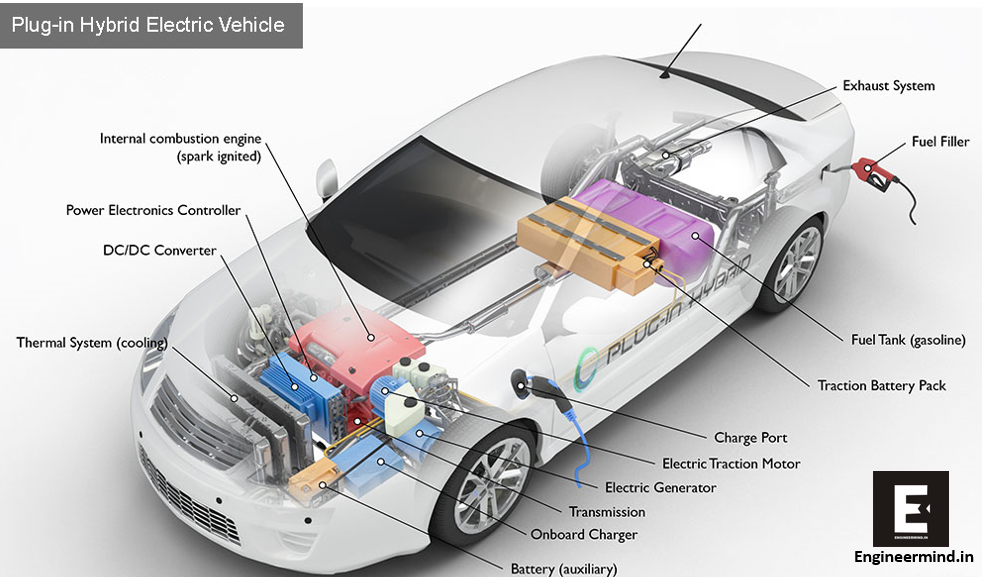
Table of Contents
What is a Hybrid Car?
The phrase “hybrid car” refers to any automobile that possesses both an internal combustion engine (also known as an ICE) and an electric motor. Additionally, hybrid vehicles have two batteries, one of which is dedicated to the internal combustion engine (ICE), while the other battery is dedicated to the electric motor.
Types of Hybrid Cars
1. Mild Hybrid Electric Vehicles (MHEV)
MHEVs are making a comeback. Many automobiles employ MHEV powertrains without advertising them, thus you may have driven a mild hybrid without knowing it!
Mild hybrids use internal combustion engines the most. During cruising, coasting, and braking, the electric motor can assist the engine. It starts you off, and then the engine and motor accelerate you.
The next hybrid on our list, the full hybrid electric vehicle, is more fuel-efficient than an MHEV.
2. Full Hybrid Electric Vehicles (HEV)

The full hybrid electric vehicle (HEV) is likely the first hybrid you think of. They have mild hybrid electrical components but powerful motors and batteries. They replace more internal combustion engine work.
Full hybrids, like mild hybrids, cannot be charged externally. They charge from the engine and regenerative braking. They are more fuel-efficient than mild hybrids but less than plug-in hybrids.
3. Plug-in Hybrid Electric Vehicles (PHEV)

PHEVs advance the hybrid concept. All other hybrids charge internally. Plug-in hybrids can be charged externally, increasing their electric-only range and fuel economy.
Model-specific electric-only range. Some can go 50 miles on electric power, while others need a gasoline engine.
Plug-in hybrids are a great compromise (electric vehicles and internal combustion vehicles). The electric-only range can cover short commutes or grocery store outings, saving gas. Your internal combustion safety net eliminates range concerns on extended rides!
Reasons to Buy a Hybrid Car
Environmental Benefits
Reduced Emissions
One of the primary advantages of hybrid cars is their reduced emissions. By combining an electric motor with a traditional combustion engine, hybrid cars emit significantly fewer greenhouse gases compared to conventional vehicles. This reduction in emissions helps combat air pollution and contributes to a cleaner and healthier environment.
Energy Efficiency
Hybrid cars are designed to optimize fuel consumption by utilizing advanced technologies. They employ regenerative braking, which harnesses and stores energy that is typically lost during braking. This stored energy is then used to power the electric motor, reducing the overall reliance on fossil fuels and increasing energy efficiency.
Cost Savings
Fuel Efficiency
Hybrid cars are renowned for their exceptional fuel efficiency. The combination of an electric motor and a combustion engine allows them to maximize mileage while minimizing fuel consumption. With rising fuel prices, owning a hybrid car can lead to substantial savings on fuel costs over the long term.
Tax Incentives
In many countries, purchasing a hybrid car makes you eligible for various tax incentives and rebates. Governments encourage the adoption of hybrid technology by offering tax credits, reduced registration fees, or even exemptions from certain taxes. These incentives not only make hybrid cars more affordable initially but also contribute to long-term cost savings.
Performance and Power
Instant Torque
Hybrid cars provide instant torque, thanks to their electric motors. Unlike traditional combustion engines, which require time to rev up, electric motors deliver immediate power. This instant torque translates to quick acceleration and a smooth driving experience, making hybrid vehicles a joy to drive.
Acceleration
Contrary to common misconceptions, hybrid cars are not lacking in power. In fact, many hybrid models have impressive acceleration capabilities. The combination of the electric motor and the combustion engine allows hybrid cars to deliver a dynamic driving experience while maintaining excellent fuel efficiency.
Reliability and Durability
Hybrid cars are built to be reliable and durable. Manufacturers have made significant advancements in hybrid technology, ensuring that these vehicles can withstand the rigours of daily driving. Additionally, hybrid car components, such as batteries, are designed to last for many years, offering peace of mind to owners.
Maintenance and Longevity
Maintaining an electric car is similar to maintaining a conventional vehicle. The technology has matured to a point where specialized maintenance is rarely required. Routine servicing and regular checks on the electrical system and battery are usually sufficient. Moreover, the longevity of hybrid car components has improved over the years, reducing the need for frequent repairs or replacements.
Technology Advancements
Regenerative Braking
One of the remarkable technologies found in hybrid cars is regenerative braking. This system harnesses the kinetic energy generated during braking and converts it into electricity, which is then stored in the battery. Regenerative braking not only increases energy efficiency but also reduces wear on the braking system, leading to improved longevity.
Start-Stop System
Hybrid vehicles often feature a start-stop system, which automatically shuts off the engine when the vehicle comes to a stop, such as at traffic lights. This system conserves fuel by reducing idling time. When the driver releases the brake, the engine restarts seamlessly, resulting in reduced fuel consumption and emissions.
Future-Proof Investment
Investing in a hybrid car ensures that you are prepared for the future of transportation. With the increasing focus on sustainability and the rapid development of electric vehicle technology, hybrid cars provide a bridge between conventional cars and fully electric vehicles. By opting for a hybrid car, you are making a future-proof investment that aligns with the evolving automotive landscape.
Higher Resale Value
Hybrid cars not only offer a range of immediate benefits but also provide a long-term advantage when it comes to resale value. Here’s why hybrid Four Wheel tends to hold their value better than conventional vehicles.
Lower Depreciation Rates
One of the significant factors contributing to the higher resale value of hybrid cars is their lower depreciation rates. While all vehicles experience depreciation over time, hybrid cars tend to retain their value better due to their growing popularity and increased demand. The market for used hybrid cars remains strong, allowing owners to recoup a higher percentage of their initial investment when selling or trading in their vehicles.
Increasing Demand
The demand for hybrid vehicles has been steadily increasing as more people recognize their environmental benefits and cost-saving advantages. As concerns about air pollution and fuel efficiency continue to rise, the demand for hybrid cars is expected to grow even further. This sustained demand contributes to higher resale values, as buyers are willing to pay a premium for these eco-friendly and fuel-efficient vehicles.
Conclusion
Hybrid cars offer a compelling range of benefits that make them an attractive option for environmentally conscious individuals. From reduced emissions and fuel efficiency to impressive performance and future-proofing, there are numerous reasons why you should consider buying a hybrid car. By choosing a hybrid, you can contribute to a greener planet while enjoying the advantages of modern automotive technology.
FAQS
Are hybrid cars more expensive than conventional cars?
While hybrid cars may have a slightly higher upfront cost compared to conventional cars, the long-term savings on fuel and potential tax incentives often outweigh the initial investment. Additionally, as hybrid technology continues to advance, prices are becoming more competitive.
Are hybrid cars suitable for long-distance driving?
Yes, hybrid cars are suitable for long-distance driving. The combustion engine in hybrid motorcars ensures a long driving range, similar to that of conventional cars. The electric motor provides additional power and fuel efficiency, making hybrid vehicles an excellent choice for both city driving and long trips.
Do hybrid cars require special charging stations?
No, hybrid cars do not require special charging stations. Unlike fully electric vehicles, hybrid cars utilize a combination of an internal combustion engine and an electric motor. The electric motor charges through regenerative braking and does not need external charging.
Can hybrid vehicles run solely on electricity?
Hybrid vehicles cannot run solely on electricity for extended periods. The electric motor in a hybrid car assists the combustion engine and provides additional power during acceleration. However, the engine will still run and recharge the battery as needed.
How long do hybrid car batteries last?
Hybrid car batteries are designed to last for the lifetime of the vehicle. Most manufacturers offer warranties on hybrid car batteries, which typically range from 8 to 10 years or a certain mileage threshold. With proper care and maintenance, hybrid car batteries can last well beyond their warranty periods.









